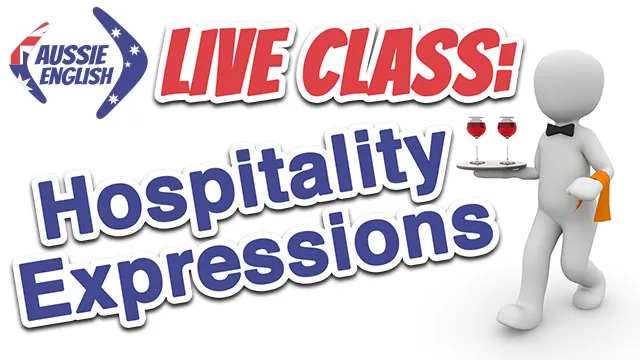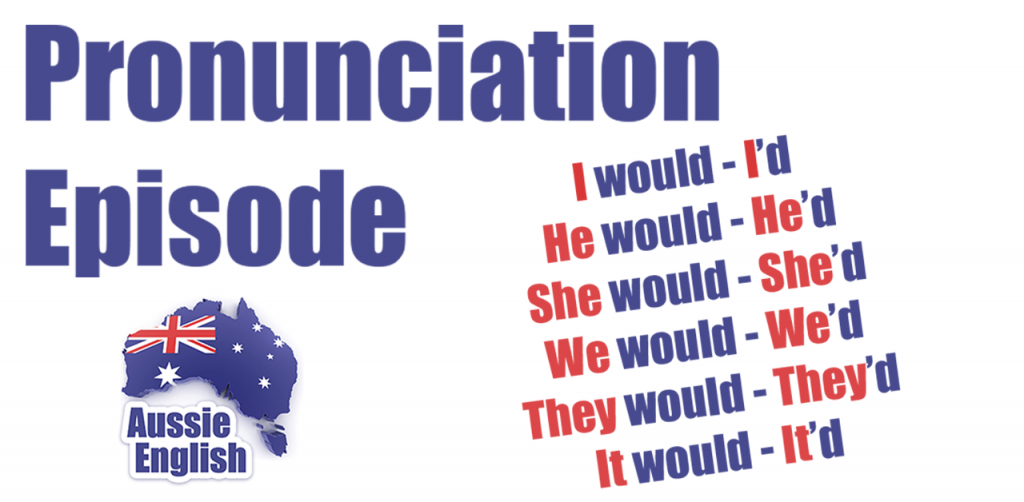Pronunciation: Contracting WOULD onto NOUNS & NAMES
Learn Australian English in this Pronunciation episode of Aussie English where I teach you how to contract WOULD onto names & nouns like a native!
Pronunciation: Contracting WOULD onto NOUNS & NAMES
Alright, guys. Here we are in the next episode for contracting WOULD.
Hopefully you’ve been enjoying the series so far.
Remember that WOULD is an auxiliary verb that you can use in several different tenses in English, but here in this lesson we’re just going to focus on WOULD in the CONDITIONAL PRESENT tense.
So:
I would eat this,
I would go there,
I would be here.
So, in the case of contracting WOULD onto nouns whether they’re names or objects, things, WOULD just becomes “’D” and it sounds like “E-D”, like the past tense.
It sounds the same, that “ed” sound, “ed”. You bounce that “ed” sound, the “’D” when it’s written as contracted “ed” off the last syllable of the word onto which it’s contracted.
And the vowel sound in between the word and that “’d” isn’t really that important.
You could actually probably say any vowel that you want, it might sound a little weird, and this is where accents come into it.
But the most important thing is to have the “D” there.
So, for example:
PETE WOULD becomes PETE’D,
JANE WOULD becomes JANE’D,
SARAH WOULD becomes SARAH’D,
ALEX WOULD becomes ALEX’D.
So, you’ll hear there that if the words end with a consonant sound, like PETE, JANE and ALEX, like PETE, JANE, ALEX, you say an “ed” sound after those names for this contraction.
PETE’D,
JANE’D,
ALEX’D.
If the word ends in a vowel sound like SARAH you just say the “D”.
It’s almost like you’ve just turned that word into ending with a “D”.
So, instead of saying “SARAH’ED*” I say, “SARAH’D, SARAH’D.”
* ‘ED is only written hear to emphasise the sound I’m making.
Worst-case scenario guys, if you’re worried that someone’s not going to understand you if you do this sort of stuff, and this is what I do when I speak with people who don’t speak English as a native language and they get confused if I do some of these contractions, I just uncontract it.
So, if I said SARAH’D and the person looked at me a little strange and didn’t know what I was talking about I would just say SARAH WOULD.
So, don’t worry too much about confusing people.
Worst-case scenario you just repeat what you said without contracting things.
And again, this is why I like getting you guys to practice both the uncontracted and the contracted forms.
So, you’re thinking about both at the same time.
So, in today’s episode it’s going to be a little bit different because I’ve included the 10 most common male names and the 10 most common female names.
And in the following examples I’ve actually put them into sentences.
So, let’s practice two forms in this first exercise with the 10 most common male names.
And the form’s going to be NAME + WOULD LIKE TO + VERB as well as NAME + WOULD LOVE TO + VERB.
So, these are pretty much the same thing. WOULD LOVE TO and WOULD LIKE TO are just gradations of the same thing that you want to say.
WOULD LOVE TO is probably a little more intense than WOULD LIKE TO. So, WOULD LIKE TO is like, “Yeah, I’d be interested in that.”
And WOULD LOVE TO would be like “Oh my gosh! I am incredibly interested in doing that.”
So, for example.
“I’d like to each chocolate” is sort of like “eh… I could eat chocolate. I want to eat chocolate. Alright”.
But “I would LOVE to each chocolate” is like “I really really really want to each chocolate!”.
So, there’s just that basic idea of a more increased desire to do something when you say WOULD LOVE TO than WOULD LIKE TO.
Anyway, let’s just get straight into it guys.
Here are the ten most common names in America.
Substitution Exercise 1:
10 most common male names:
- Noah would like to go home.
________________________________________
- Liam would love to eat more.
________________________________________
- Mason would like to play.
________________________________________
- Ethan would like to learn guitar.
________________________________________
- Lucas would love to go to sleep.
________________________________________
- Oliver would like to go surfing.
________________________________________
- Aiden would love to leave the party.
________________________________________
- Elijah would like to hang out with us.
________________________________________
- Benjamin would love to see you again.
________________________________________
- James would like to know more.
________________________________________
So, now we’ll go through 10 of the most common female names, guys.
And this time we’re going to practice a different set of structures or forms, where we’re going to practice WOULD RATHER + VERB, and we’re also going to practice WOULD PREFER TO + VERB.
So, WOULD RATHER + VERB, and note WOULD RATHER + VERB, there’s no TO.
You don’t say WOULD RATHER TO + VERB.
No, no, no, no, no.
It’s just WOULD RATHER + the VERB in the infinitive form.
Would rather go.
Would rather be.
Would rather see.
Whereas, if you’re saying WOULD PREFER TO + VERB you have to say PREFER TO.
(Would) Prefer to go.
(Would) Prefer to see.
(Would) Prefer to be.
So, WOULD RATHER and WOULD PREFER TO are synonyms.
They mean exactly the same thing and can be used interchangeably.
So, let’s go guys.
Here are the 10 most common females names, and we’re going to be saying sentences where I want you to contract WOULD onto the names, and we’re also going to be practicing WOULD PREFER TO and WOULD RATHER.
Let’s go.
Substitution Exercise 2:
10 most common female names:
- Emma would prefer to drink orange juice.
________________________________________
- Olivia would rather play with her dolls.
________________________________________
- Ava would prefer to go outside.
________________________________________
- Sophia would rather be with her parents.
________________________________________
- Mia would prefer to watch TV.
________________________________________
- Isabella would rather stay up late tonight.
________________________________________
- Charlotte would prefer to go to the zoo.
________________________________________
- Amelia would rather play in the playground.
________________________________________
- Harper would prefer to sleep in this morning.
________________________________________
- Abigail would rather go surfing.
________________________________________
So, practice those a few times guys and hopefully you learn well those different sentences, the different ways of being able to say WOULD LIKE TO or WOULD LOVE TO in that first example with the 10 most common boys names. And then also the different ways of saying WOULD RATHER or WOULD PREFER TO.
So, hopefully you guys are enjoying that.
And just to end here guys I’ve got 10 of the most common English nouns where we can do another substitution exercise this time just focusing on contracting WOULD onto the different nouns.
So, this is going to be a simple one guys, and you can focus solely on the contraction of WOULD into ‘D.
So, listen and repeat after me. If you want to make it a little easier or treat it as a substitution exercise if you guys want to make things harder.
Substitution Exercise 3:
10 most common English nouns:
- The time would go so slowly.
________________________________________
- The year would be over soon.
________________________________________
- The people would get angry.
________________________________________
- The way would never be easy.
________________________________________
- The day would feel pretty long.
________________________________________
- The man would never know.
________________________________________
- The thing would look better here.
________________________________________
- The woman would scream at you.
________________________________________
- The world would never accept this.
________________________________________
- The child would be hungry.
________________________________________
So, there you go guys.
I hope it’s not getting too long and frustrating learning these things. Just keep practicing.
Don’t worry too much about perfecting it.
It’s ok if you get things wrong from time to time.
We all make mistakes and even native speakers make these kinds of errors too from time to time.
The only thing you guys should be worried about is improvement.
If you make 10 mistakes today but tomorrow you make 9 mistakes you’ve improved.
So, don’t worry too much.
Just keep practicing and you are only going to get better.
See you in the next episode guys.
Here's what you get when you sign up!
- Read while you listen using the Premium Podcast player.
- Understand every word in every episode.
- Download all PDF transcripts and MP3s for 600+ episodes.
- Get access to bonus member-only episodes.












Responses